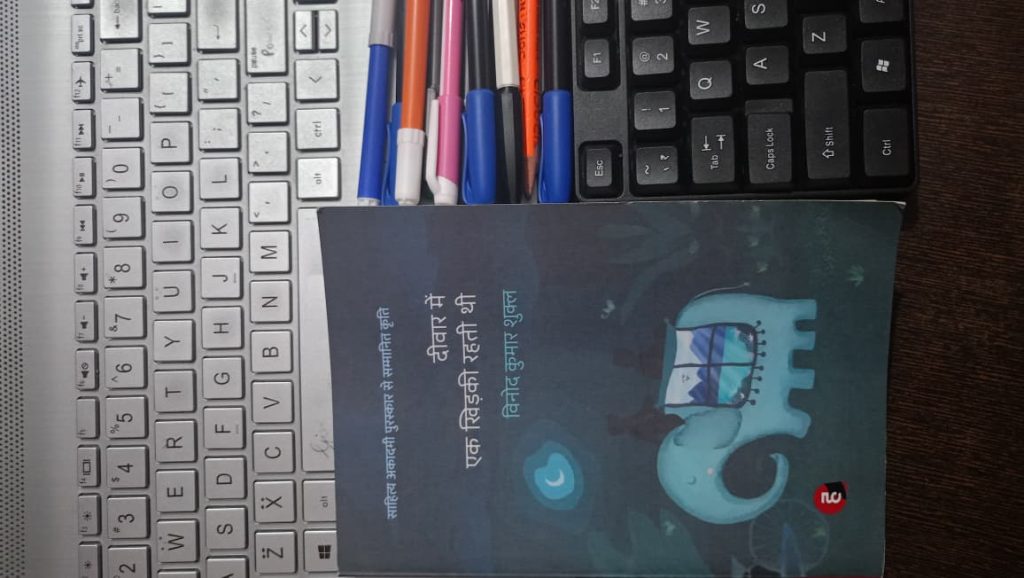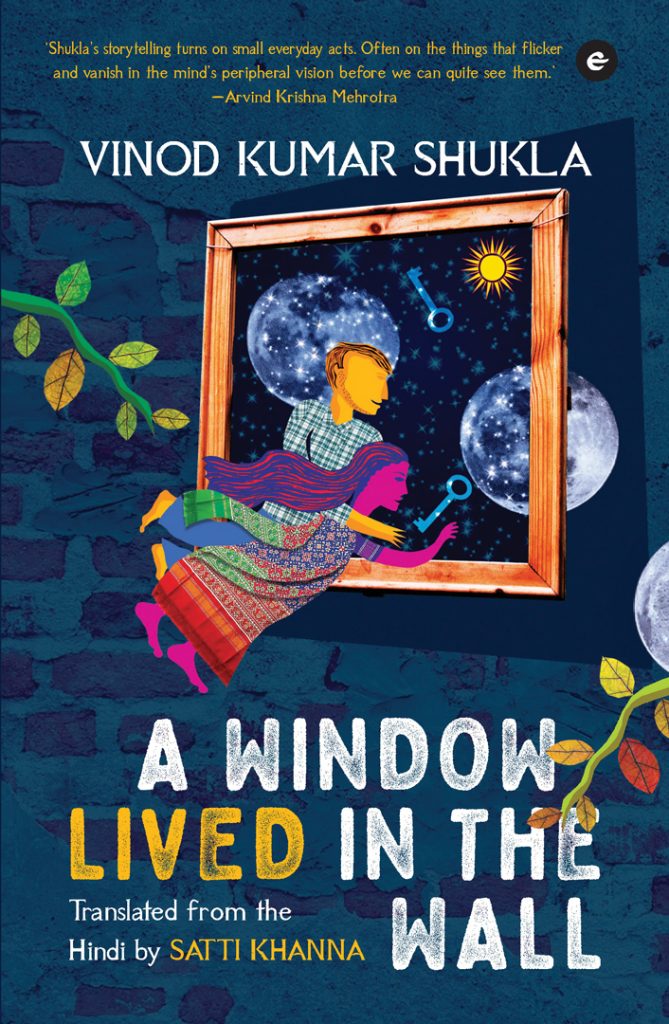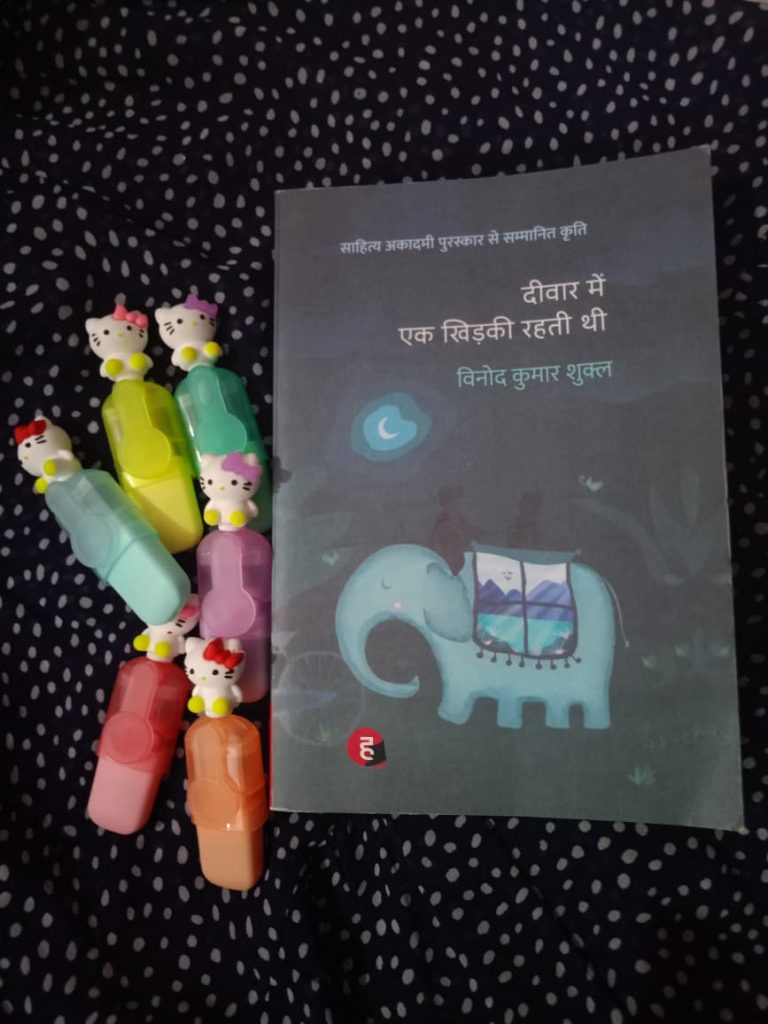विनोद कुमार शुक्ल जी की यह किताब सरल और आरामदायक सी मालूम होती है, परंतु बड़ा ही सोचनीय विषय छूती हुई आगे निकल जाती है।
कहानी का सार
दीवार में एक खिड़की रहती है। कोई बड़ा दुनिया बदल देने वाला वाक्या इसमें नहीं है और न ही किसी क्रांति की बात की जाती है। होता है सादा जीवन और उसका सरल-सीधा विस्तार। 1997 में प्रकाशित और साहित्य अकादमी पुरस्कार से सम्मानित यह उपन्यास एक छोटे शहर के महाविद्यालय के युवा गणित व्याख्याता रघुवर प्रसाद और उनकी पत्नी सोनसी की कहानी है।
रघुवर प्रसाद और सोनसी एक कमरे के किराए के मकान में रहते हैं। यही कमरा उनकी पूरी दुनिया है – बैठक, रसोई और शयनकक्ष सब कुछ। कमरे में एक दरवाजा और एक खिड़की है, और यही खिड़की इस उपन्यास के केंद्र में है।
एक बात जो मुझे लगी कि हाथी का किताब में होना अजीब लगना चाहिए था, मगर नहीं लगा। हाथी पर ही पूरी कहानी बुनी हुई लगती है। खिड़की के पार कूदकर सोनसी और रघुवर प्रसाद एक जादुई दुनिया में पहुंच जाते हैं, जहां नदी है, तालाब हैं, पशु हैं, पक्षी हैं, और जंगल भी। वहां एक बूढ़ी अम्मा चाय की टपरी चलाती हैं।
साधु नाम का एक व्यक्ति हाथी पर सवार होकर रघुवर प्रसाद को महाविद्यालय छोड़ने आता है। यह हाथी सिर्फ एक पशु नहीं, बल्कि कहानी का महत्वपूर्ण पात्र है जिसके साथ मुख्य किरदारों का गहरा लगाव है।

प्रकृति और प्रेम का चित्रण
पति-पत्नी के बीच निकटता का भी वर्णन किया गया है, परंतु प्रकृति के सहारे से। रही बात प्रकृति की, तो प्रकृति का इससे बेहतर वर्णन आजकल के लेखकों से शायद न हो पाए। विनोद कुमार शुक्ल प्रेम और प्रकृति के कवि हैं जो सीधे सरल शब्दों में जादुई बातें कहने के माहिर हैं।
खिड़की के अंदर बसे जीवन में परिवारजनों का एक छोटा-सा सुरक्षित और चिर-परिचित संसार है। सोनसी के चौके से उठने वाली साग-भाजी की खुशबू और बर्तनों की खड़खड़ाहट से मकान का घर में रूपांतरित होना बेहद खूबसूरती से दिखाया गया है।
खिड़की का प्रतीकात्मक अर्थ
अब बात करते हैं खिड़की की। शीर्षक से यह साफ है कि कहानी में खिड़की है। खिड़की है या कोई दूसरी दुनिया का पोर्टल। यह खिड़की सिर्फ एक खिड़की नहीं, बल्कि सपनों, उम्मीदों और आजादी का प्रतीक है।
दोनों पति-पत्नी और उनके माता-पिता ही खिड़की पार करके उस ओर पहुंच पाते हैं और आनंद उठा पाते हैं। बड़े साहब उस ओर नहीं जा पाते। मेरा मानना है कि वे दुनियादारी में कहीं ज्यादा उलझे हुए हैं और खिड़की के बारे में स्वार्थपूर्ण भावना से जाना चाहते थे। खिड़की के इस पार की दुनिया हर किसी को दिखाई नहीं देती।
कहानी में आगे जाकर पैसों की भी चर्चा है, परंतु कोई खास महत्व उसे नहीं मिला है।
साहित्यिक विशेषताएं
“दीवार में एक खिड़की रहती थी” उपन्यास के अंदर एक कविता है या कविता की शक्ल में एक उपन्यास है। यह किसी भी प्रकार की जांच-पड़ताल या शिकायत से मुक्त एक चित्र है।
उपन्यास की भाषा संवादों की अनेक परतों को एक साथ दिखाती है। पात्र जब दैनंदिन जीवन के सामान्य कार्य निपटा रहे होते हैं, तभी वे सपने भी देख रहे होते हैं और तभी वे प्रेम भी कर रहे होते हैं।
हाथी का उसके मालिक के साथ संबंध भी तारीफ के योग्य है। यह खिड़की वास्तव में मुझे लगता है कि एक आम कल्पना में ही थी या हो सकता है उनकी परस्पर समझ का परिचायक हो।
उपन्यास का संदेश
यह उपन्यास उस जीवन का समारोह मनाता है जो मामूली है। कोई रोचक या अप्रिय घटना नहीं है यहां, कोई किरदार ऐसा नहीं है जिसे खलनायक का दर्जा दिया जा सके। यही इस उपन्यास की सबसे रोचक और सुंदर बात है।
यह उन पाठकों के लिए है जो भाषा में शोर नहीं बल्कि मौन की गहराई को समझना चाहते हैं। यह दिखाता है कि कैसे साधारण लोगों की जिंदगी में भी जादू और रोमांच हो सकता है।
अब मैं आपको अपने पसंदीदा वाक्यों/अंशों से अवगत कराती हूं:
पृष्ठ – 9
“बचपन से सुबह उठने पर उन्हें लगता था कि रात उनके शरीर में धूल लगी रह गई है और फिर नहाकर, हाथ-मुंह धोकर वे साफ और तरोताजा हो सकेंगे।”
पृष्ठ-16
“एक काम के न होने का एहसास दूसरे काम पर भुला दिया जाता है, चाहे दूसरा काम करने जैसा न भी हो।”
पृष्ठ-10
“ऐसा नहीं था कि बाहर मैदान से थोड़ी जगह लेकर टैम्पो में रख देते तो जगह बन जाती।”
यदि आप भी मानते हैं कि जिंदगी के छोटे-छोटे पलों में ही असली खुशी छुपी है, तो यह पुस्तक आपके लिए है। इसे पढ़कर आप अपने आसपास की दुनिया को नई नजरों से देखेंगे।
Book Review: Deewar Me Ek Khidki Rehti Thi

Vinod Kumar Shukla’s book seems simple and soothing, yet it touches upon a deeply contemplative theme as it moves forward.
Story summary
A window lived in a wall. There is no world-changing incident here, nor is there talk of any revolution. What unfolds is a plain life and its simple, straightforward expansion. Published in 1997 and honored with the Sahitya Akademi Award, this novel tells the story of a young mathematics lecturer, Raghuvar Prasad, at a small-town college, and his wife, Sonsi.
Raghuvar Prasad and Sonsi live in a rented single-room house. This one room is their entire world—living area, kitchen, and bedroom, all in one. The room has a door and a window, and this very window is at the center of the novel.
One thing that struck me is that the presence of an elephant in the book should have felt odd, but it didn’t. The whole story seems woven around the elephant. Leaping across the window, Sonsi and Raghuvar Prasad reach a magical world where there is a river, ponds, animals, birds, and even a forest. There, an old mother runs a small tea stall.
A man named Sadhu rides an elephant to drop Raghuvar Prasad at the college. This elephant is not just an animal, but an important character in the story, with whom the main characters share a deep attachment.
Nature and love
The closeness between husband and wife is depicted too, but through the prism of nature. As for nature, perhaps it cannot be portrayed better by most contemporary writers. Vinod Kumar Shukla is a poet of love and nature, a master at saying magical things in simple, direct words.
Within the life housed inside the window lies a small, safe, and familiar world of family. The way the smell of greens from Sonsi’s cooking corner and the clatter of utensils transform a mere house into a home is shown with exquisite beauty.
Symbolism of the window
Now, let’s talk about the window. From the title it’s clear the story has a window. Is it a window, or a portal to another world? This window is not just a window, but a symbol of dreams, hope, and freedom.
Both husband and wife and their parents are able to cross the window to the other side and find joy there. The big boss cannot go there. In my view, he is far more entangled in worldly concerns and wanted to approach the window with a selfish intent. The world on this side of the window is not visible to everyone.
Later in the story, there is talk of money too, but it is not given any particular importance.
Literary qualities
“A Window Lived in the Wall” is a poem within a novel—or a novel shaped like a poem. It is an image free from any kind of scrutiny or complaint.
The language of the novel reveals multiple layers of dialogue at once. As the characters carry out ordinary tasks of daily life, they are also dreaming, and at the same time, they are loving.
The elephant’s relationship with its handler is also praiseworthy. This window, in truth, seems to have existed in a shared imagination—or perhaps it is an emblem of their mutual understanding.
Message of the novel
This novel celebrates the life that is ordinary. There is no thrilling or unpleasant incident here, and no character who could be called a villain. That is the most interesting and beautiful thing about this novel.
It is for those readers who seek not noise in language, but the depth of silence. It shows how even in the lives of ordinary people there can be magic and adventure.
क्या आपने भी कभी अपने जीवन में कोई जादुई खिड़की देखी है? अपने अनुभव टिप्पणी में साझा करें!
Have you seen any magical window? Let me know in the comments!
Seeya in the next one 🙂


